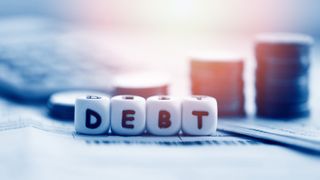If you've ever searched online for how to get out of debt, consolidating what you owe is usually one of the most popular forms of advice that you'll happen across. It may sound like the solution you've been searching for, and the best debt consolidation companies are certainly an option that can help, but when should you consolidate debt and should it be considered a viable debt relief option?
What is consolidating your debt?
The process of consolidating debt basically involves rolling all your outstanding debts into a single loan. The aim is to reduce the number of different payments that you need to make to different places to make your debt easier to keep on top of, and hopefully to reduce high interest debt to a low interest loan.
Why should I consolidate debt?
Swapping multiple smaller debts for a single debt may seem pointless, as you will have the same outstanding balance in the end. So, if consolidating your debt merely transfers it, rather than eliminating it, how does it help you get out debt?
There are three clear advantages to consolidating debt:
Lower your interest rates
Consolidation loans may provide a lower rate of interest when compared to the interest rate of the original debt. Although this won't get rid of debt, it will help you reduce it quicker.
For example, if you have multiple credit card debts it is likely that all interest payments on them are in double digits and extremely high. This high interest amount makes paying even the smallest of credit debt slow and hard going. Most of the monthly payment will be paying the interest not the principle of the loan.
Changing the multiple high interest loans into a single low interest loan will save you hundreds, if not thousands in interest payments. So, it will help you get out of debt by lowering future payments and making them more manageable.

Huge psychological boost
Having a single payment per month is a huge psychological boost. Sometimes the repetitive nature of paying multiple bills in a row, can make it seem like your debt is endless and out of control, when it might not necessarily be so. A single payment will eliminate this feeling, meaning you will be less stressed.
As you'll no longer have to juggle multiple payments, you'll also be less stressed about organizing you payments. Not only does this ease your burden, but it means you'll no longer have to worry about missing payments or accruing penalties on debts that you missed or forgot about.
Better credit score
Paying off the debt from your credit cards can result in a better credit score. If you are consolidating credit card debt, it will eliminate the outstanding debt on the card. This in turn will give you a lower credit utilization ratio, which means you will be using a smaller percentage of the credit that you are allowed to borrow. And this lower credit utilization results in a better credit score.
How do you consolidate debt?
There are number of methods to consolidate debt, but the two most popular methods are:-
0% balance transfer on credit cards
Transferring to a 0% balance on transfers credit card will eliminate all interest on the debt for the introductory period. This is a great method for paying off the loan without having to worry about the interest growing. Balance transfers are a fantastic option for low level debts because they can be paid relatively quickly. You should concentrate eliminating the debt transferred during the introductory period.
Fixed-rate consolidation loan
Debt consolidation loans are low interest options for bringing your debt together into one place. As these loans run for three to four years, they are better suited to higher amounts of debt that will take three to seven years to pay.
While these are two of the lowest risk options, other ways to consolidate your debt do exist, like borrowing against the equity in your home or 40(1)K. Our comparison of debt consolidation methods can help you choose the best option.
When is it best to consolidate debt?
Consolidating your debt is an approach best used for low level debts, and for replacing high interest loans with a low interest debt. It should only be used with a budget or a larger plan. A rough checklist to consider is:
- You have a plan or budget in place to prevent further loans
- You have enough income to make the repayments consistently
- Your credit score is low enough to get a low interest personal loan or 0% credit card transfer
- Your total debt excluding mortgage doesn't exceed 40% of your gross income
- Your debt is small
- You have multiple high interest debt that benefit from consolidation.
We'd only recommend you considering a consolidation service if you can say yes to all of these criteria. Consolidating with high debt or without a plan will most probably fail to help with debt.
"The overall goal should be to roll high-interest debt into a lower interest rate, which will save you money over the long term and ideally reduce your monthly payments. However, in some cases, in order to achieve a monthly payment that's doable, people end up extending the terms of their loan," explains Fifth Third Bank.
"Do the math for your situation and determine what's most important to you. If you've been missing payments and impacting your credit score, then you may simply want a single payment you can afford—and be willing to take a bit longer to pay it down to achieve that. It may be that paying the reduced interest rate even with a longer-term is still less than paying down your debt under your current terms."

How to succeed with a consolidation plan
There are five key components to making a consolidation strategy successful.
Have a budget in place
When trying to get out of debt you must have a clear plan. A budget will allow you to cater for all your expenses, and stop you over spending.
Stop using credit cards
Changing your spending habits is the biggest hurdle to get out of debt. If you have high levels of credit card debt, then you most probably need to change your spending habits. Stop using cards to lower the amount of debt you are accruing.
Set yourself goals
Having clear goals will help keep you motivated and give you something to work towards. It is best to keep the goals small and achievable, so you get that 'wow' factor often and allow it to drive you forward.
Track your progress
Tracking your progress is important. Without keeping tabs on the amount of debt you've paid off or how much you've saved could leave you directionless. Momentum and progression is important for motivation.
Embrace emotional support
Emotional support is important for keeping yourself motivated and on plan. There are great groups out there that will help and support you if you are in debt.
When not to consolidate debt?
If you have a very small amount of debt that will be finished or paid off in less than six months, a debt consolidation loan is unlikely to be a good idea, as it might prolong the repayment terms and the saving will likely be very small. Just following a debt snowball method or debt avalanche method of repayment might be a better option.
At the other end of the scale, if you're heavily in debt and failing to make repayments, the best debt settlement companies might be an option worth exploring. However, as they differ from consolidation services in many important ways, you'll need to weigh up which is the best option for you first.

